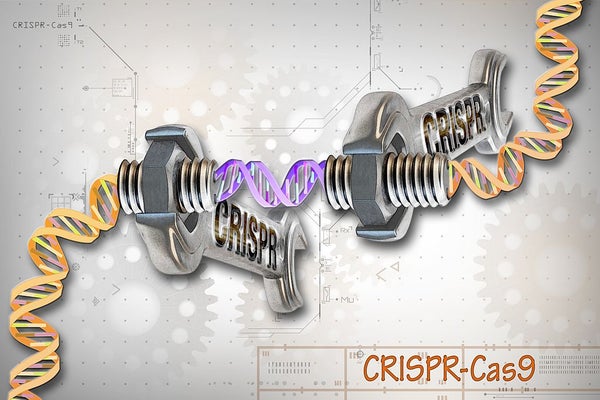This article was published in Scientific American’s former blog network and reflects the views of the author, not necessarily those of Scientific American
The National Academies of Sciences and National Academy of Medicine today published a report “Human Genome Editing: Science, Ethics, and Governance” that contends with uses of gene editing for human reproductive purposes, prospects which have been brought into vivid reality since the emergence of new biotechnology tools such as the gene modification system, Crispr-Cas9. The report suggests limitations on genetic engineering to the heritable “germline” code of embryos, or even earlier upstream in the process, sperm and ovum, which convey information passed on to subsequent generations.
However, the report appears to exclude the public from participation and concludes that “clinical trials using heritable germline genome editing should be permitted.” They should not—not without public discussion and a more conscious evaluation of how this impacts social standing, stigma and identity, ethics that scientists often tend to cite pro forma and then swiftly scuttle.
The statement is a striking reversal in outlook of leadership since just a year ago in December 2015, when the International Summit on Human Gene Editing was held at the National Academy of Sciences in Washington D.C., a conference which I attended, also drawing Nobel laureates, lawmakers, and bioethicists from across the globe, and declaring that a “broad societal consensus” be attained before moving ahead with altering heritable code. Indeed, weeks after the Summit, U.S. lawmakers added a “rider” to an omnibus spending bill to prevent the Food and Drug Administration from spending time or money reviewing applications of gene modification to heritable code.
On supporting science journalism
If you're enjoying this article, consider supporting our award-winning journalism by subscribing. By purchasing a subscription you are helping to ensure the future of impactful stories about the discoveries and ideas shaping our world today.
Unlike more than 40 other countries, and an international treaty Council of Europe Convention on Human Rights and Biomedicine, the U.S. does not have a legal ban on modification to heritable code, but it does have a strong regulatory framework on drugs, and federal agencies treat Crispr-Cas9 as a drug. But the limitations on heritable code are only in effect temporarily in so far that spending is restricted on applications FDA can review.
Marcy Darnovsky, director for the Center for Genetics and Society noted the report appears to send from scientists to lawmakers a “green light for proceeding with efforts… to engineer the genes and traits that are passed on to future children and generations” while noting that it “excludes the public from participation in deciding whether human germline modification is acceptable in the first place.”
In fact, there are a number of critical arguments on how we determine what is acceptable. The first is technical. The field of genetics is by no means accomplished. A group called the Human Aggregation Consortium just last year revealed that of 192 high frequency genetic variants that had previously been considered pathogenic, only nine are likely harmful—an important clarification for anyone wanting to recode their genome. Most mutations have very small effects on biological traits, and we know very little about how genetic variants enhance or diminish other genetic variants and differ based on genetic background.
Secondly, as Darnovsky, and Hille Haker, a bioethicist from Loyola University in Chicago, have pointed out that gene modification in combination with reproductive technologies to engender a “genetically connected child” is not a medical necessity. There is a difference between a negative right, which is a “freedom from,” a harm, and a full positive right, which is a “freedom to” access or gain some benefits. If a gene-edited child were a full positive right, society would be required to pay for all of its citizens to have children, apply genetic tests, gene modification and in vitro fertilization techniques to anyone who wants one. Importantly, scientists who patent gene modification systems such as Crispr-Cas9 have an interest in selling it as much as possible, which means the scientists themselves cannot be left solely responsible for shaping the moral framework—the public has an important role to play in shaping the morays around science today more than ever. And the debates are becoming more nuanced and sophisticated as gene editing systems such as Crispr-Cas9 allow us to do things like circumvent the old cause celebre of altering human embryos, by editing heritable code in the sperm or eggs.
Our genomes are a constantly undergoing alteration and it would be incorrect to conceive of them as sacrosanct. Genes are shuffled with each new generation so it’s unlikely that gene editing will give some families permanent advantages. The theory of evolution suggests that we adapt to local conditions rather than progress to a more perfect form. But gene modification risks “market based eugenics,” meaning putting values on certain traits, and seeking to eliminate other traits, when genetic variants that contribute to many features such as autism, neuropsychiatric disorders, may be less a disease as ways of being in the world.
Evolution does not create values, we do. And we risk molding our children into commodities we would like to have, rather than emphasizing the people they can become. Darnovsky wrote the problem is “stigmatizing people with disabilities, exacerbating existing inequalities, and introducing new eugenic abuses. Strangely, there’s no apparent connection between those dire risks and the recommendation to move ahead.” The philosopher-scientist Jean Rostand wrote a generation ago, “science has made us gods even before we are worthy of being men.” But those are professional experts. It’s time to hear more from the public on what we think.
Jim Kozubek is the author of Modern Prometheus: Editing the Human Genome with Crispr-Cas9
